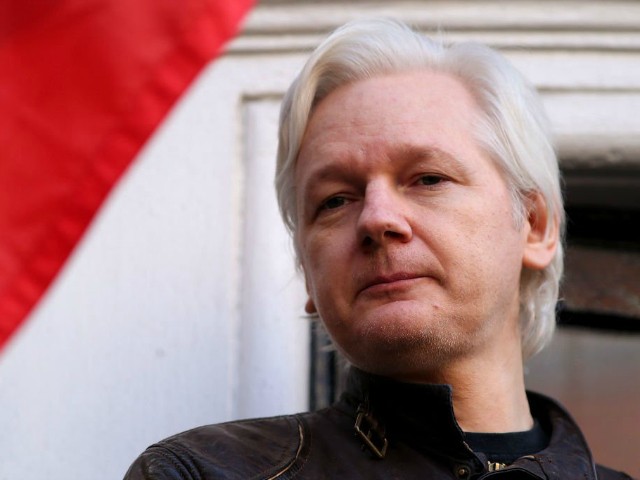Far-left activists with the anti-American group Code Pink interrupted the beginning of a conversation on Wednesday between Washington Post journalist David Ignatius and Secretary of State Antony Blinken, demanding freedom for WikiLeaks founder Julian Assange.
Blinken was participating in an event for World Press Freedom Day to discuss the threats that journalists face while doing their jobs, cohosted by the Washington Post and Reporters Without Borders (RSF). RSF published its Press Freedom Index on Wednesday to mark the occasion. The organization invited Blinken to participate in its event despite the United States, under Blinken’s boss, President Joe Biden, dropping three spots to number 45 in the rankings of freest countries to conduct journalism in. RSF did not fault Biden for the deterioration of press freedom in the country, instead claiming that the decline, partially due to the homicide of a journalist for which a Nevada Democrat was arrested last year, was “despite” Biden’s best efforts. Instead, RSF blamed the general public for having “unprecedented levels of distrust in the American media” as the reason for allegedly diminished press freedoms in the country.
The two activists, which Code Pink later identified as leader Medea Benjamin and Tighe Barry, stormed the stage waving pro-Assange homemade signs and complaining that the two participants in the discussion had not said “one word” about Assange, although Ignatius had begun introducing the event minutes prior and had not yet finished his first question to Blinken, so the secretary of State had yet to speak at all.
Security at the event rapidly whisked the shouting protesters off the stage while an apparently nervous Blinken urged them, “Take it easy, guys.”
“We’re here to celebrate freedom of expression, and we just experienced it,” Ignatius said following the removal of the activists.
The event continued without incident following the interruption, focusing mostly on Russia’s invasion of Ukraine. Russia ranked 164 out of the 180 countries that RSF studied for its Press Freedom Index. Ignatius and Blinken did not discuss the majority-communist and -socialist countries that rounded out the top ten, with the exception of China; Ignatius asked Blinken if he believed China could help end the Russian invasion of Ukraine. They did not discuss the Assange case following the interruption.
North Korea took the 180th spot on the RSF list, the world’s worst place to attempt journalism. North Korea has no media independent of the communist state apparatus and its flagship, the Korean Central News Agency. China ranked only above North Korea on the list.
The rest of the top ten included the explicitly communist governments of Vietnam and Cuba; socialist Eritrea and Syria; and socialist-aligned Iran, Turkmenistan, and Myanmar. Bahrain, number 171, was the only country in the bottom ten not governed by a left-wing regime.
Code Pink is a radical leftist organization that specializes in loudly interrupting events to defend the interests of communist regimes and left-wing activists. It is particularly active in defending the Cuban Communist Party and the violent socialist regime of Nicolás Maduro in Venezuela. Shortly after the Blinken incident, Code Pink leftists interrupted an event featuring former Venezuelan President Juan Guaidó who, abandoned by the Venezuelan socialist “opposition,” was deported from Colombia to America in late April while attempting to attend a conference on the future of Venezuela. No Venezuelan parties attended the Colombian government-led summit:
BREAKING: CODEPINK, joined by students and peace activists, gave faux Venezuelan president Juan Guaidó the welcome he deserves at the Wilson Center.
NO ROOM FOR PUPPET PRESIDENTS IN DEMOCRACY! pic.twitter.com/PNNA9LnE2B
— CODEPINK (@codepink) May 3, 2023
Julian Assange is the founder of WikiLeaks, an organization that publishes raw information leaked or otherwise stolen from the United States. It claims to be interested in exposing governments generally but overwhelmingly focuses on America. In his capacity at WikiLeaks, which he no longer leads, Assange did not write articles or curate information, which led to particular outrage following the publication of sensitive government documents that included the names of Afghan collaborators with America, exposing them to Taliban retribution. Human rights groups urged WikiLeaks to protect those individuals with confidentiality, to no avail.
Following several incendiary, anti-American leaks, Assange took refuge in the Ecuadorian embassy in London to avoid extradition to Sweden, where he had been charged with sexual assault. He spent seven years in the Ecuadorian embassy, where he reportedly fathered two children – despite allegedly being in poor health – and ultimately cost the Ecuadorian people $1 million a year. Then-President Lenin Moreno of Ecuador ordered his expulsion in 2019 on the grounds that he had “violated the agreement we reached with him and his legal counsel too many times.”

Julian Assange speaks to the media from the balcony of the Embassy of Ecuador on May 19, 2017, in London, England (Photo by Jack Taylor/Getty Images).
Moreno called Assange “disrespectful and aggressive” and lamented in his announcement of his decision, “Ecuador’s patience with the behavior of Mr. Assange has reached its limit.” The British government arrested Assange shortly thereafter.
In addition to the initial Swedish charges, Assange faces up to 175 years in prison in the United States for alleged espionage, among other crimes related to WikiLeaks activity. The British government approved his extradition to America in June. The case has been mired in appeals since.
Follow Frances Martel on Facebook and Twitter.
COMMENTS
Please let us know if you're having issues with commenting.